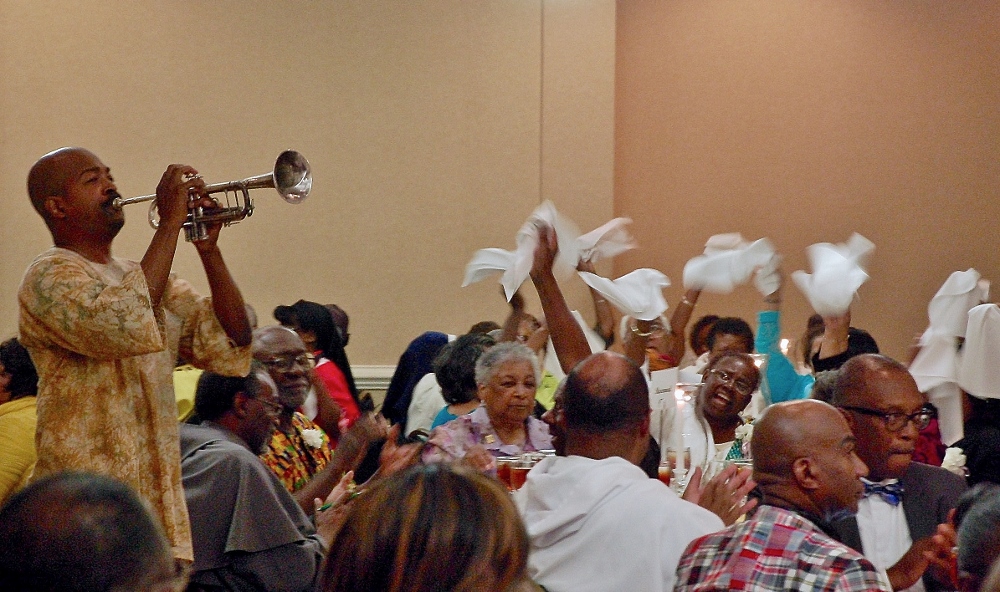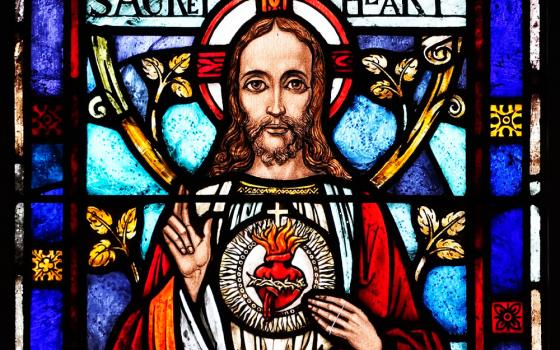
Deacon Melvin Tardy rouses the crowd the evening of July 29 with "When the Saints Go Marching In," at the joint meeting between the National Black Sisters Conference and three black clergy groups in Charleston, S.C. (NCR photo/Dan Stockman)
When officials from four groups of black Catholic clergy selected Charleston as the location of their 2015 joint conference more than a year ago, they did not expect to gather in a city rocked by a shooting that shocked the nation.
On June 17, a man entered the historic Emanuel African Methodist Episcopal Church and joined a Bible study for about an hour before he began firing a handgun, killing nine people and wounding another. Dylann Roof, 21, was arrested and charged with federal hate crimes. He reportedly confessed, saying he had hoped to incite a race war.
Just over a month later, from July 27 to 29, the National Black Sisters' Conference, the National Association of Black Catholic Deacons, the National Black Catholic Seminarians Association and the National Black Catholic Clergy Caucus held their annual joint conference. Each group has its annual conference at the same time and place as the others so they can come together for joint fellowship and inspiration.
The conference came with inspiration no one expected. One morning, attendees went to Mother Emmanuel, as the church is known, and toured the building — the first tour conducted since the shooting.
"It was such a powerful feeling, being there," Franciscan Sr. Jannette Pruitt said. "We prayed for the people, their families, ourselves and our churches, then sang. For me, the most powerful part was singing 'Blessed Assurance.'"
Others agreed that the conference being in Charleston was no accident.
"It's an important sign of the times that our organization would be here to witness and pray with them," said Sr. Patricia J. Chappell, a Sister of Notre Dame de Namur. "I think it's had an impact on our gathering here: It's a reminder for us that we still need to continue what we have been doing. It's very powerful that we were here at this point in time."
Deacon Joseph Connor of Seattle, president of the deacons' group, was not only in awe of the location but of the news that family members of the shooting victims had forgiven the gunman.
"The fact that we're here and able to pray and support this community after this horror — it's only God," Connor said. "The thing that touched all of us was [that] these Christians forgave that young man. There's nothing more powerful than forgiveness, because that's what God calls us to do."
Sr. Barbara Spears from the Sisters of the Holy Names of Jesus and Mary said it was clear during the tour that they were in a "very holy and sacred place."
"I found myself fighting back tears when we walked up to that door," Spears said. "We as black Catholic men and women realized their pain, and our response was to be in solidarity with them."
She said she was overcome again when she saw black cloth draped over the chair of the pastor, who was killed in the shooting.
Sr. Roberta Fulton said one reason the shootings resonated so deeply for blacks is the importance of the church in everyday life.
"In the African-American community, the church is the place we go for just about everything we need," said Fulton, a Sister of St. Mary of Namur.
That makes gatherings like the joint conference especially important, several attendees said, because most serve in majority-white parishes or congregations and don't have that piece of community they may have grown up with. Others say they need the gatherings regardless.
"I'm in a predominantly African-American community, but this conference for me is a source of the strength I need to keep on keeping on," Fulton said. "I've been coming to these for over 30 years."
Spears said being black is a gift, but she also needs to recharge at times.
"I'm the only African-American in my congregation, and my church is predominantly white. In that situation, my response is to bring my gift of blackness and black spirituality and witness that in those moments," Spears said. "But there are times I need to be refueled. There are times I choose to go to a multicultural church that's more like the real world. I look for places where I can be who I am. So this conference is like a family reunion — I can be nourished, but also challenged."
Several attendees mentioned the need to educate the larger church about black Catholics and the fact that they are not some new, rare phenomenon, but date back to the beginnings of the Christian church. Many struggle with the perception that they must bend their spirituality to conform to a white culture.
"We need to dispel the myths — Catholicism is not a European institution," said Franciscan Fr. Robert Seay from Lafayette, La. "Young ladies and men still have a difficult time because the culture doesn't change, we have to change to the majority culture."
But none of the attendees says the struggles are too hard, and no one is willing to give up.
"Nobody's going to run me out of my church," Holy Cross Br. Ray Smith said. "This is who I am. I was raised a cradle Catholic. It's mine. It's not like I'm a visitor."
[Dan Stockman is national correspondent for Global Sisters Report. Follow him on Twitter @DanStockman or on Facebook.]




